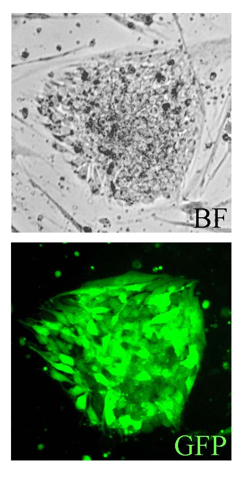 Peter Donovan, Ph.D.
Peter Donovan, Ph.D.
Program Director, CIRM Training Grant II; Principal Investigator, CIRM Shared Research Laboratory and Stem Cell Techniques Course; Professor, Department of Developmental and Cell Biology
Molecular Genetics of Germ Cell and Stem Cell Development – Our laboratory is interested in four critical aspects germ cell and stem cell biology. One aspect is the regulation of developmental potency within the mammalian germline and within pluripotent stem cells derived from germ cells (embryonic germ cells, or EG cells) and from early embryos (embryonic stem cells, or ES cells). Learning how to control stem cell potency may point to new methods of maintaining EG or ES cells in an undifferentiated state for a prolonged period of time, or avoid the tumorigenic potential of these cells when transplanted into animals. A second major area of  research is aimed at understanding the factors that control the survival of hES cells. Using factors that support clonal survival of hES cells we have improved methods for genetically modifying hES cells. We are using such techniques to carry out high throughput screens to identify pathways that regulate stem cell survival and proliferation of hES cells. These pathways may be critical to understanding how to grow hES cells in very large scale as well as understanding why hES cells can become aneuploid in culture. Finally, we are using models to determine key safety issues associated with stem cell transplantation. These studies are aimed at understanding how genomic imprinting, karyotype and developmental potency may be affected by cell culture and how transplanted ES cells and EG cells behave upon transplantation. In a separate area of research we seek to understand another key aspect of germline differentiation, namely meiosis. Our research has focused on identifying key molecules that regulate meiosis in mammals. We have identified the dual specificity phosphatase, Cdc25B, as a key regulator of meiotic maturation in female mammals. Our ongoing research is aimed at understanding how Cdc25B activity is regulated and at identifying proteins that interact with Cdc25B to control its function.
research is aimed at understanding the factors that control the survival of hES cells. Using factors that support clonal survival of hES cells we have improved methods for genetically modifying hES cells. We are using such techniques to carry out high throughput screens to identify pathways that regulate stem cell survival and proliferation of hES cells. These pathways may be critical to understanding how to grow hES cells in very large scale as well as understanding why hES cells can become aneuploid in culture. Finally, we are using models to determine key safety issues associated with stem cell transplantation. These studies are aimed at understanding how genomic imprinting, karyotype and developmental potency may be affected by cell culture and how transplanted ES cells and EG cells behave upon transplantation. In a separate area of research we seek to understand another key aspect of germline differentiation, namely meiosis. Our research has focused on identifying key molecules that regulate meiosis in mammals. We have identified the dual specificity phosphatase, Cdc25B, as a key regulator of meiotic maturation in female mammals. Our ongoing research is aimed at understanding how Cdc25B activity is regulated and at identifying proteins that interact with Cdc25B to control its function.
Recent Publications
- Easley, C.A., Ben-Yehudah, A., Redinger, C.J., Oliver, S.L., Varum, S.T., Eisinger, V.M., Carlisle, D.L., Donovan, P.J. and Schatten, G.P. (2010) mTOR-mediated Activation of p70 S6K Induces Differentiation of Pluripotent Human Embryonic Stem Cells. Cellular Reprogramming, 12(3):263
- Denham, M., Leung, J., Tay, C., Wong, R.C.B., Donovan, P.J., Dottoir, M. and Pebay, A. (2009). A new feeder-free technique to expand human embryonic stem cells and induced pluripotent stem cells. The Open Stem cell Journal. 1, 76-82.
- Acharya, M.M., Christie, L.A., Lan, M, Donovan, P.J., Cotman, C.W., Fike, J.R..and Limoli, C.L. (2009). Rescue of radiation-induced cognitive impairment through cranial transplantation of human embryonic stem cells. Proc. Natl. Acad. Sci. (USA). 106(45):19150-5
- Shuda, K.M., Schindler, K., Ma, J., Schultz, R.M. and Donovan, P.J. (2009). Aurora Kinase B regulates modulates chromosome alignment in mouse oocytes. Mol. Reprod. 76 (11):1094-105.
- Zeng, W., de Greef, J.C., Chen, Y-Y., Chien, R., Kong, X., Gregson, H.C., Winokur, S.T., Pyle, A., Robertson, K.D., Schmiesing, J.A., Kimonis, V. E., Balog, J., Frants, R.R., Ball, A.R., Lock, L.F., Donovan, P.J., van der Maarel, S. M. and Yokomori, K. (2009). Specific loss of histone H3 lysine 9 trimethylation and HP1γ/cohesin binding at D4Z4 repeats is associated with facioscapulohumeral dystrophy (FSHD). PLOS Genetics. 5(7):e1000559.


